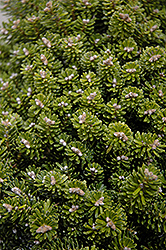Silber Mavers Korean Fir
Abies koreana 'Silber Mavers'
Height: 5 feet
Spread: 5 feet
Sunlight:
![]()
![]()
Hardiness Zone: 5
Description:
An uncommon yet very attractive dwarf fir tree with twisting dusty-green needles with silver undersides for a beautiful color effect; a good size for home landscapes, and makes an excellent presentation as a garden accent
Ornamental Features
Silber Mavers Korean Fir is a dwarf conifer which is primarily valued in the landscape or garden for its ornamental globe-shaped form. It has attractive bluish-green foliage with silver undersides. The needles are highly ornamental and remain bluish-green throughout the winter. The purple fruits are held in cones from late summer to late winter. The smooth gray bark adds an interesting dimension to the landscape.
Landscape Attributes
Silber Mavers Korean Fir is a dense multi-stemmed evergreen shrub with a more or less rounded form. Its relatively fine texture sets it apart from other landscape plants with less refined foliage.
This is a relatively low maintenance shrub, and usually looks its best without pruning, although it will tolerate pruning. It has no significant negative characteristics.
Silber Mavers Korean Fir is recommended for the following landscape applications;
- Accent
- Mass Planting
- Hedges/Screening
- General Garden Use
Planting & Growing
Silber Mavers Korean Fir will grow to be about 5 feet tall at maturity, with a spread of 5 feet. It tends to fill out right to the ground and therefore doesn't necessarily require facer plants in front, and is suitable for planting under power lines. It grows at a slow rate, and under ideal conditions can be expected to live for 50 years or more.
This shrub does best in full sun to partial shade. It requires an evenly moist well-drained soil for optimal growth. It is not particular as to soil pH, but grows best in sandy soils. It is quite intolerant of urban pollution, therefore inner city or urban streetside plantings are best avoided, and will benefit from being planted in a relatively sheltered location. Consider applying a thick mulch around the root zone in winter to protect it in exposed locations or colder microclimates. This is a selected variety of a species not originally from North America.
